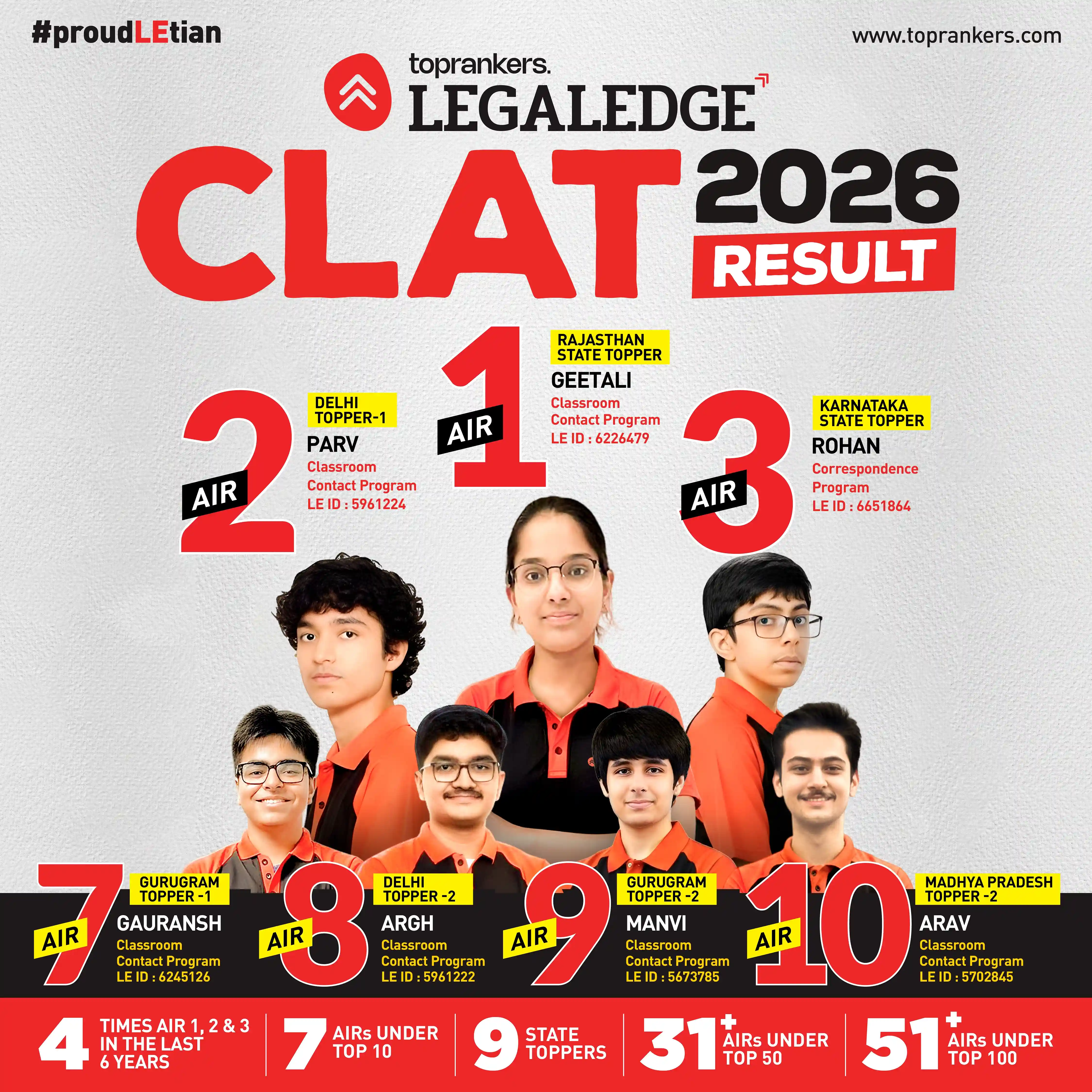How to Read a Newspaper for CLAT 2027/2028, Analysis and Notes Making Tips
November 20, 2025
Reader's Digest: Making reading newspapers your habit is not that difficult if you see it, but maintaining that habit actually takes a lot of effort, time, energy, and enthusiasm. This post will give you complete insights into reading newspapers for the CLAT entrance exam.
Reading newspapers has numerous advantages in any competitive exam, but it is especially beneficial for CLAT.
The biggest advantage of reading a newspaper is that it adds value to your preparation by strengthening your GK and boosting your reading speed & comprehension over time.
If you are one of those aspirants who have been ignoring newspapers because of too much content or any other reason, it is high time to make it a habit to read a newspaper daily.
The newspaper is one of the biggest passive prep boosters, where all you do is actively read, and it fixes and builds many of the skills you require to crack such an entrance exam.
Read through the post that will give you a complete insight into how to read a newspaper for the CLAT 2027 exam, the time required to read the newspaper, and more.
The following video by LegalEdge sheds light on newspaper reading and notetaking strategy and is a must-watch for all CLAT 2027/2028 aspirants.
Tips & Tricks for Newspaper Reading for CLAT 2027/2028
Newspapers assist you in preparing for the exam in various ways, from improving reading comprehension and vocabulary to developing analytical abilities. Also, it will help enhance your CLAT GK preparation and score well in CLAT 2027.
Most of you might have difficulty finding references for current affairs topics while reading newspapers because reading newspapers requires skills and routine, while studying current affairs from other sources is a shortcut.
Being an aspiring law student, you must understand which news is essential in the newspaper from the CLAT perspective.
To make it easier, we have provided a few tips and tricks below to help you better understand how to read newspapers for the CLAT exam.
Skimming and Filtering
First of all, you should filter out the main topics of the newspaper which are relevant for exams and have a national or international consideration.
After reading items from apps and websites, you should read the newspaper. This is because articles you create for websites are repeated, and you have a deeper understanding of these issues after receiving an introduction from websites.
Prime Focus Areas
Don't get involved in local or state news. They will never appear on a question paper, for if it were important enough, it would be printed under the national header and not the state-specific one.
Always concentrate on national and international concerns, such as a policy that has been reintroduced in parliament, any deal or formal/informal talks between India and any other country, the names of Acts, and the names of technical and financial terminology.
It is natural not to understand parts of articles in the newspaper when all you have read about that topic is the article itself, which is why employing IAS websites for more in-depth knowledge about particulars helps strengthen your knowledge base.
Read more: Short tricks to enhance your CLAT English preparation
Editorial Tips
Most importantly, read the editorials carefully because they will help you improve your reading speed, which will aid you in the actual examination because CLAT requires a good reading speed.
Editorials are not just a great source of information but also are well-worded, slightly more complex write-ups, which is why reading them first is going to level up your reading level, and with consistency, uplift your comprehension skills.
Furthermore, editorials frequently contain essential information, so note it. I'm sure that after reading an editorial, you don't churn it in your head and form your own opinion on the subject, so you read an editorial like any other piece of information and forget about it after a while.
To prevent this from happening, try this method:
As you read the editorial, pick out the words/phrases that are new to you. Look up the definitions of such words/phrases and try to construct your own sentences using them.
After reading the editorial, do some additional research on the topic touched on in the editorial and try to create your own opinions on the subject, or read and ponder on the subject.
By completing both of the aforementioned tasks, you will be able to repeat the facts and express your thoughts and opinions about the subject of the editorial.
So, anytime a particular topic arises, and if you've read an editorial on the subject, you'll recall it because you've reflected on it. You've intentionally attempted to comprehend and develop your ideas on the subject.
You will definitely be better equipped for the exam, and, in general, if you go by this approach, and I speak from experience, it does work wonders.
Important Do's and Dont's
A major don’t for CLAT aspirants is reading many newspapers. Most topics and information overlap, and it becomes extremely redundant. Utilise your time wisely.
Keep your own current-events journal. Focus on topics such as committees in the news, legal developments, bills, major decisions, and awards, among others.
Jot Down Important Points
Make a list of relevant events in a notebook to review when the exam is coming. Make succinct points rather than long paragraphs.
You can also take cuttings of any data, graph, or object. For future reference, watch for new laws and revisions to existing ones.
Offline newspapers are preferred over online newspapers. While reading the paper, use a marker to mark any new words that come up (do not write them).
Read more: Short tricks to enhance your CLAT legal aptitude preparation
Then repeat this method for as long as you read the paper. Finally, look over the words you've highlighted and scribble down their definitions on a piece of paper, using a Thesaurus only, not a dictionary.
And I can't leave this out: Avoid reading advertisements: Yes, they are distracting and, as a result, consume a lot of your time.
Areas to Focus on While Reading the Newspaper for CLAT 2027/2028
As we all know, newspaper reading is a time-consuming factor. Therefore, you should opt for selective reading.
In this way, you can develop your ability to filter the Important topics for the CLAT exam while developing your knowledge on ignoring the non-relevant topics.
The following are the important areas that you need to focus on while reading a newspaper:
- Frontpage
- Editorial page - language, knowledge, terminology
- Recurring issues like Hong Kong protests, news related to elections, etc.
- Standard Questions: News such as appointments, records, awards, etc.
- Business-related news
- International news
Which is the Best Newspaper for CLAT Exam 2027/2028?
It might be confusing for most of you to choose the best newspaper, as numerous papers are available in the market.
You must opt for only one newspaper during your CLAT Exam Preparation rather than reading multiple newspapers daily, which will waste your time.
- If you are a beginner and have never read a newspaper, you can start by reading the Times of India or the Tribune.
- Both papers are easier to read and understand the given information effectively.
- Once you read the newspaper, you should read the Hindu or the Indian Express for relevant information.
How Much Time is Required to Read a Newspaper for CLAT 2027/2028?
You must give equal importance to all the subjects, including reading a newspaper regularly. You must schedule a time in your CLAT Study Plan to read the newspaper daily.
According to the expert, you can give a maximum of 45 minutes to 60 minutes to reading a newspaper. But not more than that!
Also, it is always better to read the newspaper in the early morning. You can read it while making your breakfast or while travelling to work. If you don't have time during the day, read it at night every day.
On a relatively busy day, or when you find the news a little tough to understand, head over to the Legal Edge YouTube channel, where daily newspaper reading is posted for the CLAT 2027 aspirants.
How to Make Notes While Reading a Newspaper for CLAT 2027/2028?

- While reading the newspaper, note down the headline or title in your own words, as this will help you memorise it for a long time.
- Also, note the research you have conducted related to each topic.
- If you are a CLAT aspirant, it is imperative to research the topics related to Daily Current Affairs.
- One of the smartest ways to make notes is by dividing the topic into sections like national, international, awards, sports, etc.
- You can also make your own notes date-wise or month-wise.
Conclusion
In conclusion, mastering the art of reading a newspaper is crucial for CLAT 2027 preparation. By following the right approach, candidates can benefit from newspaper reading. Here are the key takeaways:
- Start with an overview: Scan the headlines and subheadings to understand the day's news.
- Focus on relevant sections: Prioritize national news, current affairs, legal developments, and editorials.
- Develop reading habits: Read consistently, preferably daily, to stay updated and build comprehension skills.
- Annotate and summarise: Make notes, highlight important information, and summarise key points.
- Analyse different perspectives: Expose yourself to diverse opinions and analyse arguments critically.
- Enhance vocabulary: Pay attention to new words and phrases, and maintain a vocabulary journal.
- Practice time management: Allocate a specific time slot for newspaper reading to maintain consistency.
- Stay updated with the CLAT syllabus: Align newspaper reading with the CLAT syllabus to focus on relevant topics.
By incorporating these strategies into your newspaper reading routine, you will enhance your knowledge, analytical skills, and overall CLAT preparation for 2027.
Frequently Asked Questions
Which newspaper is best for CLAT Preparation?

What should be read in Newspaper for CLAT?

How to read newspaper for CLAT Exam?

How can I improve my vocabulary while reading a newspaper for CLAT exam?

Is it necessary to read all the news present in the newspaper for CLAT?

How much time can I give for reading a newspaper for CLAT?




SHARE